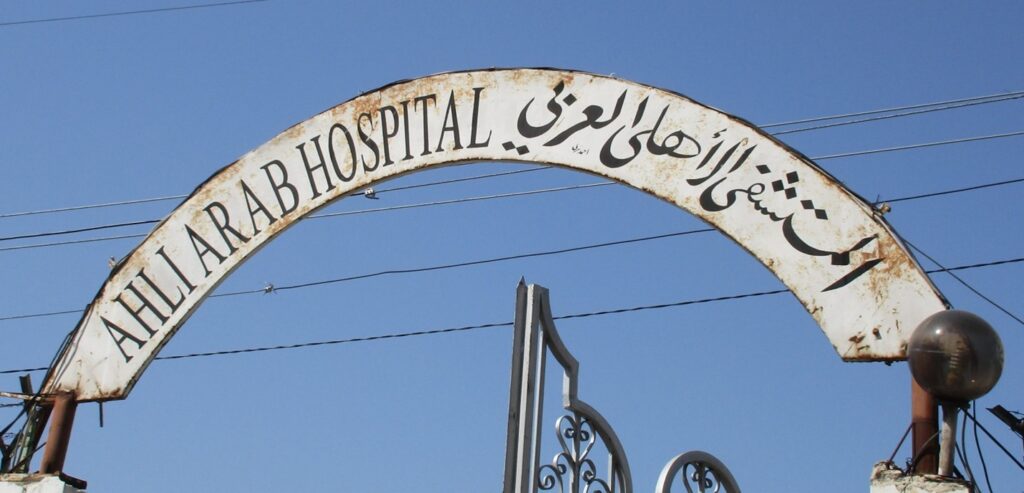An Update from Al-Ahli Arab Hospital in Gaza
Al-Ahli Arab Hospital is an institution in Gaza of the Episcopal Diocese of Jerusalem, and a long-time partner of the Christian Church (Disciples of Christ) and United Church of Christ through Global Ministries. The Episcopal Diocese of Jerusalem provided this update on the current situation in Gaza and the ongoing work of al-Ahli Hospital there.
Update on the current situation
The ongoing escalation of aggression by Israeli forces and settlers has led to a dramatic increase in casualties in both Gaza and the West Bank, exacerbating the already dire humanitarian crisis in the region. As of November 12th, 2024, more than 43,665 Palestinians have been killed in Gaza since October 7, 2023, with a staggering 70% of the victims being women and children. Additionally, over 103,100 Palestinians have been injured, many with severe trauma and life-threatening conditions. In the West Bank, over 780 Palestinians have been killed, and approximately 6,600 have been injured since October 7th, 2023. Since the onset of the war, the World Health Organization (WHO) has verified 516 attacks on health facilities and medical transport in Gaza, resulting in 765 deaths and nearly 1,000 injuries of Health professionals. Additionally, 130 ambulances have been fully destroyed by Israeli airstrikes.
According to the WHO Director General’s (Dr. Tedros Adhanom Ghebreyesus) remarks at a United Nations Security Council meeting on the situation of the health system in Gaza (November 6, 2024), 94% of health facilities in Gaza are either damaged or destroyed.
1.2 million children are in urgent need of mental health and psycho-social support, including care for depression, anxiety, and suicidal thoughts. Nearly 1.9 million displaced individuals are dependent on UNRWA, 85% of water and sanitation facilities are no longer operational.
From October 28 to November 1, 2024, more than 11,000 cases of acute respiratory infections were reported, along with rising cases of acute jaundice and bloody diarrhea. WHO estimates that up to 14,000 patients require urgent evacuation from Gaza for specialized medical care. Nine in ten children under five are affected by one or more infectious diseases. Notably, there has been a resurgence of polio in Gaza, a disease that has not been seen in the region for more than 25 years. According to the “Briefing to the Security Council on the Protection of Civilians in Gaza” by Joyce Msuya, Acting Under-Secretary-General for Humanitarian Affairs and Emergency Relief Coordinator New York, 12 November 2024, conditions of life across Gaza are unfit for human survival. Food is insufficient. Shelter items –needed ahead of winter – are in extremely short supply.
Update on the Situation in Ahli Hospital
The recent Israeli military operation in Jabalia has laid siege to northern Gaza, trapping tens of thousands of people without access to food or water. The Israeli army has effectively isolated northern Gaza from Gaza City using military vehicles, drones, and sand barriers.
Once again, the three hospitals in northern Gaza have been targeted by Israeli airstrikes and are now not functioning. These hospitals, the closest to the ongoing military operations in Beit Lahiya and the Jabalia Refugee Camp, have been heavily damaged. As a result, all casualties from the airstrikes in Jabalia and Beit Lahiya are being transferred to Ahli Hospital, located in a nearby neighborhood.
Ahli Hospital currently treats between 700 -750 outpatients daily and accommodates 170 inpatients. The hospital staff performs approximately 30 surgeries each day. However, the demand for medical supplies is exceptionally high. While Ahli Hospital has managed to purchase additional supplies from local vendors and has received some assistance from the WHO, it continues to fill the gaps left by other health facilities that have either closed or are no longer operational.
Update on al-Mawasi outreach clinic
In early April 2024, a group of dedicated doctors and staff from Ahli Hospital, who had been displaced by IDF operations in Gaza City late the previous year, recognized the urgent need for medical services in Rafah. After consulting with Archbishop Hosam, they established an outreach clinic in Rafah to provide vital medical care to thousands of displaced Palestinians who had suffered profound loss. Rafah, a city densely populated by refugees and located in the southernmost part of the Gaza Strip, was sheltering 1.4 million Gazans at that time.
A few months after the clinic began operating in Rafah, the IDF intensified its bombardment, causing many people to flee to Khan Younis-Almawasi. In response, the staff made the decision to relocate the outreach clinic to Khan Younis-Almawasi. The clinic now serves between 90 and 100 patients per day and provides psychosocial support to 30 children daily. It offers a wide range of services, including treatment for all types of wounds, trauma care, and medical attention for various diseases such as infectious diseases, OB-GYN, ENT, ophthalmological issues, and psycho-social support, among others.

